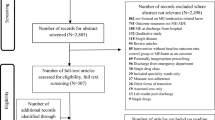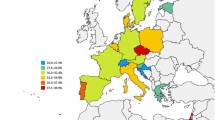Abstract
Background
Antipsychotic (AP) drugs are commonly used to manage the behavioural symptoms of dementia. Nevertheless, international (i.e. the European Medicines Agency in Europe) and national (i.e. the Medicines and Healthcare products Regulatory Agency in the UK and the Italian Drug Agency) regulatory agencies issued safety warnings against AP use in dementia in 2004 and 2009.
Objective
The aim of this study is to investigate the short- and long-term impact of safety warnings on the use of APs in UK and Italian persons with dementia using two nationwide databases: The Health Improvement Network (THIN) from the UK and the Health Search Database-Cegedim-Strategic Data-Longitudinal Patient Database (HSD-CSD-LPD) from Italy.
Methods
We calculated the overall quarterly prevalence of AP use by class and by individual drug in persons with dementia aged ≥65 years and used generalized linear models to explore the effect of the safety warnings.
Results
We identified 58,497 and 10,857 individuals aged ≥65 years with dementia from the THIN and HSD-CSD-LPD databases, respectively, over the period 2000–2012. After the 2004 warnings, the use of atypical APs decreased, whereas the use of conventional APs increased, in Italy and the UK until 2009. However, the trend for APs individually showed that the use of risperidone/olanzapine decreased, whereas the use of quetiapine increased in both countries. After the 2009 warnings (until 2012), the use of atypical and conventional APs decreased in the UK (from 11 to 9 and 5 to 3 %, respectively), but such use increased in Italy (from 11 to 18 and 9 to 14 %, respectively).
Conclusion
The 2004 warnings led to a reduction in the use of olanzapine and risperidone and increased the use of quetiapine/conventional APs in both countries. From 2009, the use of APs decreased in persons with dementia in the UK but not in Italy. Possible reasons for the difference in AP use between the two countries include a more proactive approach towards reducing the use of APs in the UK than in Italy.



Similar content being viewed by others
References
Steinberg M, Shao H, Zandi P, Lyketsos CG, Welsh-Bohmer KA, Norton MC, Breitner JC, Steffens DC, Tschanz JT, Cache County Investigators. Point and 5-year period prevalence of neuropsychiatric symptoms in dementia: the Cache County Study. Int J Geriatr Psych. 2008;23(2):170–7.
Rochon A, Normand SL, Gomes T, Gill SS, Anderson GM, Melo M, Sykora K, Lipscombe L, Bell CM, Gurwitz JH. Antipsychotic therapy and short-term serious events in older adults with dementia. Arch Intern Med. 2008;168(10):1090–6.
Ballard C, Waite J. The effectiveness of atypical antipsychotics for the treatment of aggression and psychosis in Alzheimer’s disease. Cochrane Database Syst Rev. 2006;1:CD003476.
Schneider LS, Dagerman K, Insel PS. Efficacy and adverse effects of atypical antipsychotics for dementia: meta-analysis of randomized, placebo-controlled trials. Am J Geriatr Psychiatry. 2006;14(3):191–210.
Medicines and Healthcare products Regulatory Agency (MHRA). Safety information: Antipsychotic drugs. http://www.mhra.gov.uk/Safetyinformation/Generalsafetyinformationandadvice/Product-specificinformationandadvice/Product-specificinformationandadvice-A-F/Antipsychoticdrugs/index.htm. Accessed 04 Dec 2014 .
Ballard CG, Gauthier S, Cummings JL, Brodaty H, Grossberg GT, Robert P, Lyketsos CG. Management of agitation and aggression associated with Alzheimer disease. Nat Rev Neurosci. 2009;5:245–55.
Ballard C, Hanney ML, Theodoulou M, Douglas S, McShane R, Kossakowski K, Gill R, Juszczak E, Yu LM, Jacoby R. DART-AD investigators. The dementia antipsychotic withdrawal trial (DART-AD): long-term follow-up of a randomised placebo-controlled trial. Lancet Neurol. 2009;8(2):151–7.
Trifiró G, Sultana J, Spina E. Are the safety profiles of antipsychotic drugs used in dementia the same? An updated review of observational studies. Drug Saf. 2014;37(7):501–20.
European Medicines Agency (EMA). EMEA public statement on the safety of olanzapine (Zyprexa, Zyprexa Velotab); London. 2004. http://www.bfarm.de/SharedDocs/Downloads/DE/Arzneimittel/Pharmakovigilanz/Service/aktuelles/emea-zyprexa-st.pdf?__blob=publicationFile&v=2. Accessed 18 Sept 2014.
All Party Parliamentary Group on Dementia. Always a Last Resort: Inquiry into the prescription of antipsychotic drugs to people with dementia living in care homes; London, 2008. http://www.alzheimers.org.uk/site/scripts/documents_info.php?documentID=1583&pageNumber=3. Accessed 18 Sept 2014.
Banerjee S. The use of antipsychotic medication for people with dementia: Time for action. 2009. London: Department of Health, 2009. http://www.rcpsych.ac.uk/pdf/Antipsychotic%20Bannerjee%20Report.pdf. Accessed 18 Sept 2014.
Prime Minister’s challenge on dementia 2020. London: Department of Health, 2015. https://www.gov.uk/government/uploads/system/uploads/attachment_data/file/414344/pm-dementia2020.pdf. Accessed 18 Sept 2014.
Dementia Action Alliance. The right prescription: call to action on the use of antipsychotic drug for people with dementia. London: Dementia Action Alliance. 2011. http://www.institute.nhs.uk/images//Call_to_Action/Call_to_action_v2_CHOSEN_v2.pdf. Accessed 07 July 2015.
Health and Social Care Information Centre. National Dementia and Antipsychotic Prescribing Audit. 2012. http://www.hscic.gov.uk/catalogue/PUB06624/nati-deme-anti-pres-audi-summ-rep.pdf. Accessed 18 Sept 2014.
Agenzia Italiana del Farmaco (AIFA). Il trattamento farmacologico dei disturbi psicotici in pazienti affetti da demenza (transl. Pharmacological treatment of psychosis in dementia patients). AIFA: Rome. 2005. http://www.agenziafarmaco.gov.it/it/content/il-trattamento-farmacologico-dei-disturbi-psicotici-pazienti-affetti-da-demenza. Accessed 18 Sept 2014.
Dusetzina SB, Higashi AS, Dorsey ER, Conti R, Huskamp HA, Zhu S, Garfield CF, Alexander GC. Impact of FDA drug risk communications on health care utilization and health behaviors: a systematic review. Med Care. 2012;50(6):466–78.
Schulze J, van den Bussche H, Glaeske G, Kaduszkiewicz H, Wiese B, Hoffmann F. Impact of safety warnings on antipsychotic prescriptions in dementia: nothing has changed but the years and the substances. Eur Neuropsychopharmacol. 2013;23(9):1034–42.
Gallini A, Andrieu S, Donohue JM, Oumouhou N, Lapeyre-Mestre M, Gardette V. Trends in use of antipsychotics in elderly patients with dementia: Impact of national safety warnings. Eur Neuropsychopharmacol. 2014;24(1):95–104.
Sanfélix-Gimeno G, Cervera-Casino P, Peiró S, López-Valcarcel BG, Blázquez A, Barbera T. Effectiveness of safety warnings in atypical antipsychotic drugs: an interrupted time-series analysis in Spain. Drug Saf. 2009;32(11):1075–87.
Valiyeva E, Herrmann N, Rochon PA, Gill SS, Anderson GM. Effect of regulatory warnings on antipsychotic prescription rates among elderly patients with dementia: a population-based time-series analysis. CMAJ. 2008;179(5):438–46.
Dorsey ER, Rabbani A, Gallagher SA, Conti RM, Alexander GC. Impact of FDA black box advisory on antipsychotic medication use. Arch Intern Med. 2010;170(1):96–103.
Franchi C, Tettamanti M, Marengoni A, Bonometti F, Pasina L, Cortesi L, Fortino I, Bortolotti A, Merlino L, Lucca U, Riva E, Nobili A. Changes in trend of antipsychotics prescription in patients treated with cholinesterase inhibitors after warnings from Italian Medicines Agency. Results from the EPIFARM-Elderly Project. Eur Neuropsychopharmacol. 2012;22(8):569–77.
Trifirò G, Sini G, Sturkenboom MC, Vanacore N, Mazzaglia G, Caputi AP, Cricelli C, Brignoli O, Aguglia E, Biggio G, Samani F. Prescribing pattern of antipsychotic drugs in the Italian general population 2000–2005: a focus on elderly with dementia. Int Clin Psychopharmacol. 2010;25(1):22–8.
Guthrie B, Clark SA, Reynish EL, McCowan C, Morales DR. Differential impact of two risk communications on antipsychotic prescribing to people with dementia in Scotland: segmented regression time series analysis 2001–2011. PLoS One. 2013;8(7):e68976.
Lewis JD, Schinnar R, Bilker WB, Wang X, Strom BL. Validation studies of The Health Improvement Network (THIN) database for research. Pharmacoepidemiol Drug Saf. 2007;16(4):393–401.
Prah P, Petersen I, Nazareth I, Walters K, Osborn D. National changes in oral antipsychotic treatment for people with schizophrenia in primary care between 1998 and 2007 in the United Kingdom. Pharmacoepidemiol Drug Saf. 2012;21(2):161–9.
Rait G, Walters K, Bottomley C, Petersen I, Iliffe S, Nazareth I. Survival of people with clinical diagnosis of dementia in primary care: cohort study. BMJ. 2010;341:c3584.
Valkhoff VE, Coloma PM, Masclee GM, Gini R, Innocenti F, Lapi F, Molokhia M, Mosseveld M, Nielsson MS, Schuemie M, Thiessard F, van der Lei J, Sturkenboom MC, Trifirò G, EU-ADR Consortium. Validation study in four health-care databases: upper gastrointestinal bleeding misclassification affects precision but not magnitude of drug-related upper gastrointestinal bleeding risk. J Clin Epidemiol. 2014;67(8):921–31.
Trifirò G, Mokhles MM, Dieleman JP, van Soest EM, Verhamme K, Mazzaglia G, Herings R, de Luise C, Ross D, Brusselle G, Colao A, Haverkamp W, Schade R, van Camp G, Zanettini R, Sturkenboom MC. Risk of cardiac valve regurgitation with dopamine agonist use in Parkinson’s disease and hyperprolactinaemia: a multi-country, nested case-control study. Drug Saf. 2012;35(2):159–71.
Sacchetti E, Trifirò G, Caputi A, Turrina C, Spina E, Cricelli C, Brignoli O, Sessa E, Mazzaglia G. Risk of stroke with typical and atypical antipsychotics: a retrospective cohort study including unexposed subjects. J Psychopharmacol. 2008;22(1):39–46.
Blak BT, Thompson M, Dattani H, Bourke A. Generalisability of The Health Improvement Network (THIN) database: demographics, chronic disease prevalence and mortality rates. Inform Prim Care. 2011;19(4):251–5.
Author Contributions
The authors contributed to the present study as follows. Literature search: JS, JI, CB, SS; study design/writing of protocol: JS, AF, GT; data extraction/data management: JS, FG, AP; data analysis: AF, JS, FG; writing and revision of manuscript: JS, AF, FG, AP, CB, CC, SS, ES, GG, JI, CF, MM, MS, GT; conception of study: GT. GT has access to all the data in the study and takes responsibility for the integrity of the data and the accuracy of the data analysis.
Author information
Authors and Affiliations
Corresponding author
Ethics declarations
Funding
This study was funded by the Italian Health Minister in the context of the Project “GR-2009-1607316—Assessment of the Safety of Antipsychotic Drugs in Elderly with Dementia: An International, Population-Based Study Using Healthcare Databases”. The funder played no role in the study design, data collection and analysis, decision to publish or preparation of the manuscript.
Conflicts of interest
JS, AF, FG, AP, CB, CC, SS, ES, GG, JI, CF, MM, MS and GT have no competing interests to declare directly related to the present study. CC has received consulting fees/honoraria from Bayer unrelated to this study. ES has received grants unrelated to this study, consulting fees/honoraria from Eli Lilly unrelated to this study, payment for lectures unrelated to the study and is a board member for Astra-Zeneca and Lundbeck. MM has received funding from Pfizer, Astra-Zeneca and the international Adverse Events Consortium for studies unrelated to this study. CB has received grants and personal fees from Arcadia, Lundbeck, Napp, Roche, Orion, Bial, Bristol Myer Squibb, Otusaka and Novartis unrelated to this study.
Electronic supplementary material
Below is the link to the electronic supplementary material.
Rights and permissions
About this article
Cite this article
Sultana, J., Fontana, A., Giorgianni, F. et al. The Effect of Safety Warnings on Antipsychotic Drug Prescribing in Elderly Persons with Dementia in the United Kingdom and Italy: A Population-Based Study. CNS Drugs 30, 1097–1109 (2016). https://doi.org/10.1007/s40263-016-0366-z
Published:
Issue Date:
DOI: https://doi.org/10.1007/s40263-016-0366-z




